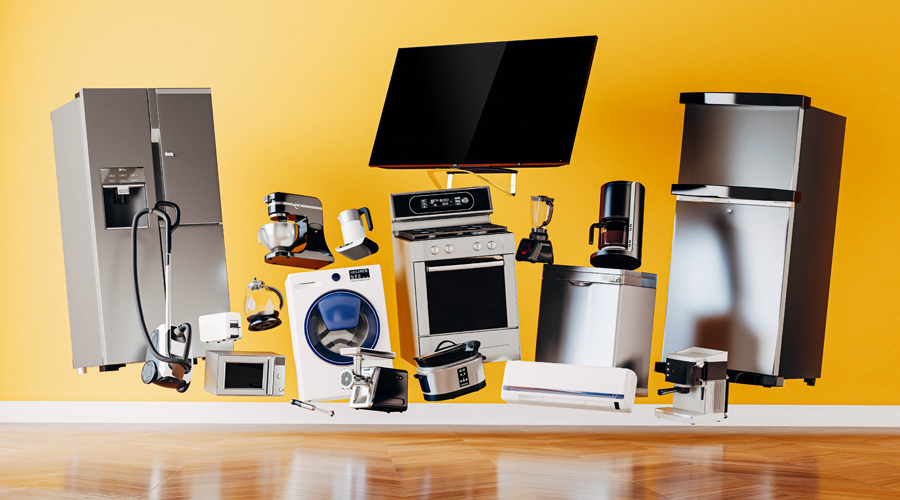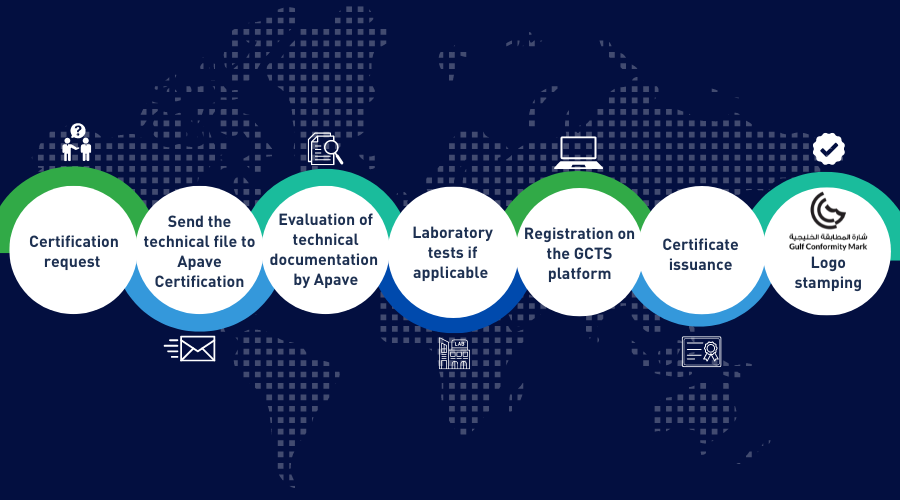What is G-Mark?
G-Mark is a necessary requirement for selling low-voltage electrical products and household appliances in the countries that make up the GCC, Gulf Cooperation Council, Standards Organisation (GSO).
With this certification, Manufacturers will have to demonstrate compliance with the safety and quality standards in force in this field, as well as with the GSO's additional requirements, contained in Gulf Technical Regulation for Low Voltage Electrical Equipment and Appliances BD-142004-01.
The G-Mark is a mandatory requirement in addition to the safety standards and procedures already in force in the six Arab countries.
What countries are concerned
about G-Mark certification?
Apave Certification can now certify Electrical Equipment that will be exported to the following countries:
- State of United Arab Emirates
- Kingdom of Bahrain
- Kingdom of Saudi Arabia
- Sultana of Oman
- State of Qatar
- State of Kuwait
What are the subjected equipments?


The conformity assessment program is applicable on 13 categories of electrical equipment and appliances:
- Domestic Electric Fans
- Refrigerators and Freezers
- Washing Machines and dryers
- Food grinders, mixers and extractors
- Toasters
- Hair-dressing apparatus such as hair dryers or curling irons and hand dryers
- Domestic heating appliances such as ovens or microwaves
- Water heaters
- Clothing irons
- Plugs, electrical sockets, adapters…
- Air conditioners
What is the certification process?


The certification process is divided into the following steps:
- Receipt and review of an application
- Issuance of Quotation
- Evaluation of technical documentation
- Examination and testing, if required
- Recommendation and approval
- Registration of G-Mark in GSO Electronic Registration System
- Issuance of Gulf Type Examination Certificate
- #1 - Certification request
#1 - Certification request
- #2 - Sending the technical file to Apave certification
#2 - Sending the technical file to Apave certification
- #3 - File checked by Apave certification
#3 - File checked by Apave certification
- #4 - Laboratory tests where applicable
#4 - Laboratory tests where applicable
- #5 - Registration on the GCTS platform
#5 - Registration on the GCTS platform
- #6 - Issuing the certificate
#6 - Issuing the certificate
- #7 - Stamping the logo
#7 - Stamping the logo
- #1 - Certification request
#1 - Certification request
- #2 - Sending the technical file to Apave certification
#2 - Sending the technical file to Apave certification
- #3 - File checked by Apave certification
#3 - File checked by Apave certification
- #4 - Laboratory tests where applicable
#4 - Laboratory tests where applicable
- #5 - Registration on the GCTS platform
#5 - Registration on the GCTS platform
- #6 - Issuing the certificate
#6 - Issuing the certificate
- #7 - Stamping the logo
#7 - Stamping the logo
- #1 - Certification request
#1 - Certification request
- #2 - Sending the technical file to Apave certification
#2 - Sending the technical file to Apave certification
- #3 - File checked by Apave certification
#3 - File checked by Apave certification
- #4 - Laboratory tests where applicable
#4 - Laboratory tests where applicable
- #5 - Registration on the GCTS platform
#5 - Registration on the GCTS platform
- #6 - Issuing the certificate
#6 - Issuing the certificate
- #7 - Stamping the logo
#7 - Stamping the logo
What are the benefits
of Gulf Conformity Marking?
- Overcome technical barriers to trade.
- Access to GCC’s single market.
- Reduce the risk of non-compliant products entering the market.
- Minimize the losses and delays in importing goods.
Apave Certification's Role
Apave Certification's role in providing G-mark Certification for the Gulf Region.
Why choose Apave?
Apave Certification is accredited by the GCC Accreditation Centre (GAC) under the ISO/IEC 17065 standard. We are a recognised GCC Notified Body for the Gulf Technical Regulation for Low Voltage Electrical Equipment and Appliances.
We have the authorisation to issue the Gulf Type Examination Certificate to manufacturers or importers intending to market equipment in GCC member states.
Discover our other
news
